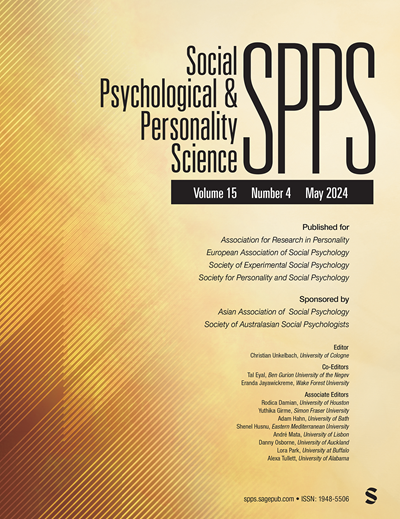Social Connectedness Promotes Robot Anthropomorphism
IF 3.3
2区 心理学
Q1 PSYCHOLOGY, SOCIAL
引用次数: 0
Abstract
Anthropomorphism has traditionally been viewed as a means to compensate for a lack of social connection; therefore, social deficits are considered to facilitate anthropomorphism. In this research, we adopted an alternative growth-oriented perspective of anthropomorphism. We posited that anthropomorphism operates as a means to explore the social world, and thus hypothesized that social connectedness promotes robot anthropomorphism. To test this hypothesis, we conducted three studies (total N = 599) examining the effect of social connectedness on robot anthropomorphism. We found that social connectedness increased robot anthropomorphism. Importantly, genuine interest in social interactions with robots accounted for this effect. In addition, anthropomorphism elicited by social connectedness predicted more favorable attitudes toward robots. These findings enrich the current understanding of anthropomorphism and have practical implications.社会联系促进机器人拟人化
传统上,拟人论被视为弥补社会联系缺失的一种手段;因此,社会缺陷被认为有利于拟人论。在本研究中,我们采用了另一种以成长为导向的拟人论视角。我们假设拟人化是一种探索社会世界的手段,因此假设社会联系促进了机器人的拟人化。为了验证这一假设,我们进行了三项研究(总共N = 599),研究了社会联系对机器人拟人化的影响。我们发现社会联系增加了机器人的拟人化。重要的是,对与机器人进行社交互动的真正兴趣解释了这种影响。此外,由社会联系引起的拟人化预测了对机器人的更有利的态度。这些发现丰富了目前对拟人论的理解,并具有实际意义。
本文章由计算机程序翻译,如有差异,请以英文原文为准。
求助全文
约1分钟内获得全文
求助全文
来源期刊

Social Psychological and Personality Science
PSYCHOLOGY, SOCIAL-
CiteScore
12.50
自引率
1.80%
发文量
77
期刊介绍:
Social Psychological and Personality Science (SPPS) is a distinctive journal in the fields of social and personality psychology that focuses on publishing brief empirical study reports, typically limited to 5000 words. The journal's mission is to disseminate research that significantly contributes to the advancement of social psychological and personality science. It welcomes submissions that introduce new theories, present empirical data, propose innovative methods, or offer a combination of these elements. SPPS also places a high value on replication studies, giving them serious consideration regardless of whether they confirm or challenge the original findings, with a particular emphasis on replications of studies initially published in SPPS. The journal is committed to a rapid review and publication process, ensuring that research can swiftly enter the scientific discourse and become an integral part of ongoing academic conversations.
 求助内容:
求助内容: 应助结果提醒方式:
应助结果提醒方式:


